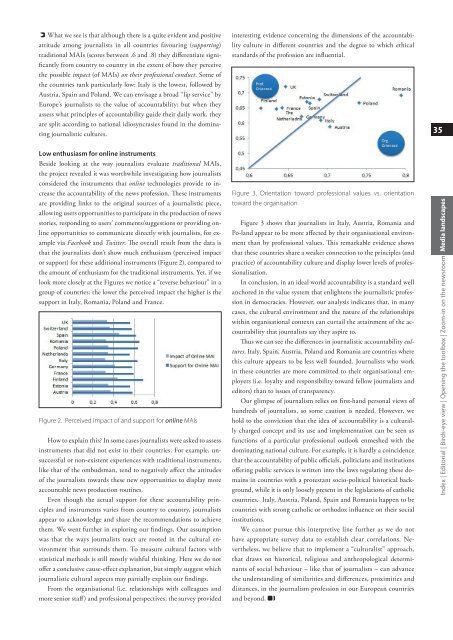MediaAcT
How fragile is media credibility? Accountability and transparency in journalism: research, debates, perspectives Final Research Report | Media Accountability and Transparency in Europe
How fragile is media credibility? Accountability and transparency in journalism: research, debates, perspectives
Final Research Report | Media Accountability and Transparency in Europe
You also want an ePaper? Increase the reach of your titles
YUMPU automatically turns print PDFs into web optimized ePapers that Google loves.
What we see is that although there is a quite evident and positive<br />
attitude among journalists in all countries favouring (supporting)<br />
traditional MAIs (scores between .6 and .8) they differentiate significantly<br />
from country to country in the extent of how they perceive<br />
the possible impact (of MAIs) on their professional conduct. Some of<br />
the countries rank particularly low: Italy is the lowest, followed by<br />
Austria, Spain and Poland. We can envisage a broad “lip service” by<br />
Europe’s journalists to the value of accountability; but when they<br />
assess what principles of accountability guide their daily work, they<br />
are split according to national idiosyncrasies found in the dominating<br />
journalistic cultures.<br />
Low enthusiasm for online instruments<br />
Beside looking at the way journalists evaluate traditional MAIs,<br />
the project revealed it was worthwhile investigating how journalists<br />
considered the instruments that online technologies provide to increase<br />
the accountability of the news profession. These instruments<br />
are providing links to the original sources of a journalistic piece,<br />
allowing users opportunities to participate in the production of news<br />
stories, responding to users’ comments/suggestions or providing online<br />
opportunities to communicate directly with journalists, for example<br />
via Facebook and Twitter. The overall result from the data is<br />
that the journalists don’t show much enthusiasm (perceived impact<br />
or support) for these additional instruments (Figure 2), compared to<br />
the amount of enthusiasm for the traditional instruments. Yet, if we<br />
look more closely at the Figures we notice a “reverse behaviour” in a<br />
group of countries: the lower the perceived impact the higher is the<br />
support in Italy, Romania, Poland and France.<br />
Figure 2. Perceived impact of and support for online MAIs<br />
How to explain this? In some cases journalists were asked to assess<br />
instruments that did not exist in their countries. For example, unsuccessful<br />
or non-existent experiences with traditional instruments,<br />
like that of the ombudsman, tend to negatively affect the attitudes<br />
of the journalists towards these new opportunities to display more<br />
accountable news production routines.<br />
Even though the actual support for these accountability principles<br />
and instruments varies from country to country, journalists<br />
appear to acknowledge and share the recommendations to achieve<br />
them. We went further in exploring our findings. Our assumption<br />
was that the ways journalists react are rooted in the cultural environment<br />
that surrounds them. To measure cultural factors with<br />
statistical methods is still mostly wishful thinking. Here we do not<br />
offer a conclusive cause-effect explanation, but simply suggest which<br />
journalistic cultural aspects may partially explain our findings.<br />
From the organisational (i.e. relationships with colleagues and<br />
more senior staff) and professional perspectives, the survey provided<br />
interesting evidence concerning the dimensions of the accountability<br />
culture in different countries and the degree to which ethical<br />
standards of the profession are influential.<br />
Figure 3. Orientation toward professional values vs. orientation<br />
toward the organisation<br />
Figure 3 shows that journalists in Italy, Austria, Romania and<br />
Po-land appear to be more affected by their organisational environment<br />
than by professional values. This remarkable evidence shows<br />
that these countries share a weaker connection to the principles (and<br />
practice) of accountability culture and display lower levels of professionalisation.<br />
In conclusion, in an ideal world accountability is a standard well<br />
anchored in the value system that enlightens the journalistic profession<br />
in democracies. However, our analysis indicates that, in many<br />
cases, the cultural environment and the nature of the relationships<br />
within organisational contexts can curtail the attainment of the accountability<br />
that journalists say they aspire to.<br />
Thus we can see the differences in journalistic accountability cultures.<br />
Italy, Spain, Austria, Poland and Romania are countries where<br />
this culture appears to be less well founded. Journalists who work<br />
in these countries are more committed to their organisational employers<br />
(i.e. loyalty and responsibility toward fellow journalists and<br />
editors) than to issues of transparency.<br />
Our glimpse of journalism relies on first-hand personal views of<br />
hundreds of journalists, so some caution is needed. However, we<br />
hold to the conviction that the idea of accountability is a culturally<br />
charged concept and its use and implementation can be seen as<br />
functions of a particular professional outlook enmeshed with the<br />
dominating national culture. For example, it is hardly a coincidence<br />
that the accountability of public officials, politicians and institutions<br />
offering public services is written into the laws regulating these domains<br />
in countries with a protestant socio-political historical background,<br />
while it is only loosely present in the legislations of catholic<br />
countries. Italy, Austria, Poland, Spain and Romania happen to be<br />
countries with strong catholic or orthodox influence on their social<br />
institutions.<br />
We cannot pursue this interpretive line further as we do not<br />
have appropriate survey data to establish clear correlations. Nevertheless,<br />
we believe that to implement a “culturalist” approach,<br />
that draws on historical, religious and anthropological determinants<br />
of social behaviour – like that of journalists – can advance<br />
the understanding of similarities and differences, proximities and<br />
distances, in the journalism profession in our European countries<br />
and beyond.<br />
Index | Editorial | Birds-eye view | Opening the toolbox | Zoom-in on the newsroom | Media landscapes


